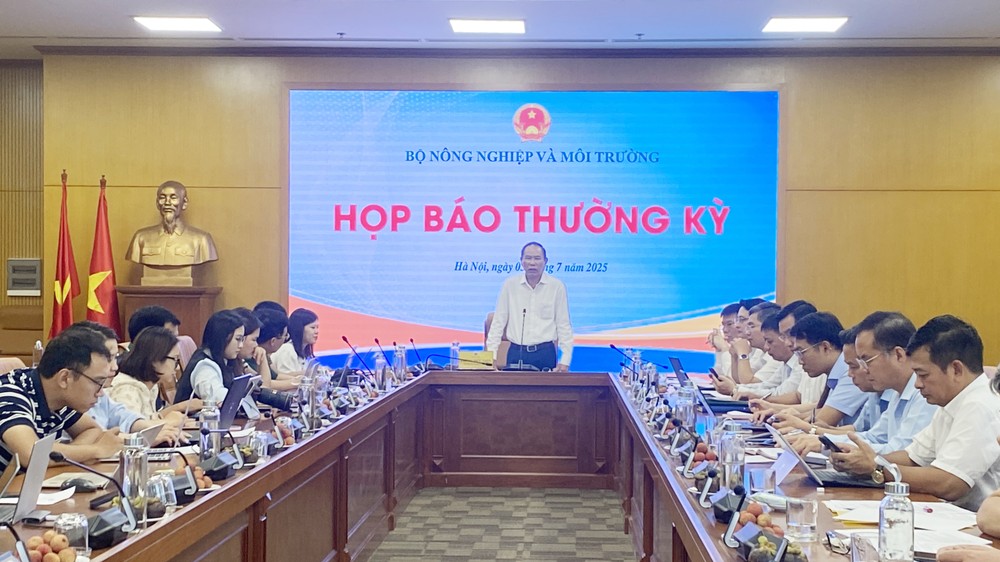
Among the issues that drew significant media attention was food safety, particularly concerns over pork products that failed to meet food safety standards and carried diseases but still made their way into retail chains. Although investigators concluded that there was insufficient evidence to press charges, the incident has continued to raise serious questions about the effectiveness of slaughterhouse oversight, disease control, and food safety enforcement by specialized agencies.
At the press conference, Mr. Pham Kim Dang, Deputy Director of the Department of Livestock Production and Animal Health, reported that in line with ministerial directives, relevant agencies have been conducting regular inspections of slaughtering activities, disease prevention, and food hygiene.
However, Deputy Minister Phung Duc Tien challenged this assertion, asking for a clear definition of what “regular and continuous” inspections actually mean. He criticized the vague, evasive responses and called them unacceptable.
He bluntly stated that slaughterhouse and food processing management has been severely lacking for years. While proposals and plans exist on paper, he noted that practical implementation remains negligible. According to official statistics, Vietnam currently has 484 centralized slaughter facilities and 24,640 small-scale operations. He warned that the current state of oversight is deteriorating further, falling short of the standards outlined in National Assembly Resolution No.13 on food safety. He demanded that the Department of Livestock Production and Animal Health present a concrete action plan.
In response, Mr. Pham Kim Dang argued that food safety relies heavily on the role of local authorities and grassroots veterinary networks. He noted that provinces with serious enforcement measures tend to have better control and emphasized the need for consumer engagement and coordination among relevant ministries, agencies and sectors.
Mr. Pham Kim Dang added that the Ministry of Agriculture and Environment is currently working with the Department of Economic, Corruption, and Smuggling Crimes Investigation (C05) under the Ministry of Public Security. He stressed that only investigative bodies have the legal authority and tools powerful enough to handle violations, whereas the veterinary sector faces limitations in inspection and enforcement.
Deputy Minister Phung Duc Tien, however, rejected that argument, calling it inaccurate. He emphasized that the livestock and veterinary sector does, in fact, have the authority to take administrative action—including license revocation and fines—and cannot pass the responsibility to other agencies.
Reiterating the need for accountability, the Deputy Minister called on the department’s leadership to clearly define responsibilities and propose actionable solutions. Mr. Pham Kim Dang responded that the department would issue written directives to provincial authorities, urging tighter surveillance. He also called on provinces to reassess the veterinary workforce and evaluate slaughterhouse conditions. He admitted, however, that recent organizational restructuring has left some veterinary units understaffed.
Addressing the specific case involving C.P. Vietnam, Mr. Pham Kim Dang said that before the recent administrative merger, the Department of Agriculture and Environment in Hau Giang Province had issued a formal report to his office. The report stated that disciplinary action had been taken against public official Nguyen Long Cuong, and the leadership of the Phung Hiep District Livestock Production, Animal Health, and Fisheries Station had been held accountable for lax oversight that led to violations in slaughtering procedures.
Concluding the press conference, Deputy Minister Phung Duc Tien emphasized that any official attending such events must be well-informed, competent, and responsible. “If you don’t grasp the issues, you shouldn’t be at the press conference,” he stated. He reaffirmed that food safety is a matter of utmost importance and cannot be addressed through superficial rhetoric or vague slogans like “comprehensive solutions.”
In addition, during the press conference, journalists raised questions regarding a recent announcement from the United States on the results of trade talks concerning retaliatory tariffs on Vietnamese goods. According to the new terms, Vietnamese exports that can prove origin will be subject to a 20 percent tariff, while transshipped goods from third countries will face a 40 percent rate. In contrast, US exports to Vietnam will enjoy a zero percent tariff. However, officials representing sectors such as crop production, fisheries, timber, and forestry products were unable to provide detailed or focused responses—demonstrating a clear lack of grasp on a matter of major economic significance.
























